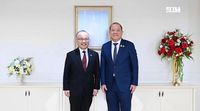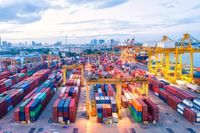Thailand is facing significant challenges in its trade relations, particularly with China, as the country navigates the complexities of export tariffs and inspection standards. The recent discussions between Thai Commerce Minister Phichai Naripthaphan and Chinese diplomatic officials have highlighted pressing issues that could affect the future of Thai exports, especially in the fruit sector.
On April 10, 2025, Minister Phichai met with Chinese Ambassador Wu Zhiwu and Economic and Trade Counselor Zhang Xiaoxiao to address the obstacles that Thai durian exports encounter due to stringent inspection measures, particularly concerning the BY2 chemical residue testing. This testing has been a major hurdle for Thai farmers and exporters, affecting the distribution of durians during the peak fruit season.
"We are requesting China to consider relaxing the current inspection measures for Thai durians, especially the 100% random testing for BY2 residues," Minister Phichai stated. He emphasized the need for faster inspections and increased resources to facilitate the flow of goods into the Chinese market. The Thai government hopes that by enhancing inspection processes, they can boost confidence in the quality of their agricultural exports.
In 2024, Thai exports to China reached a remarkable value of approximately $3.7 billion, accounting for about 97.4% of all Thai durian exports, which translates to around 833,000 tons. This impressive figure underscores the importance of the Chinese market for Thailand's agricultural sector. However, the increasing strictness of inspection standards poses a threat to this lucrative trade.
Phichai also pointed out that the current inspection measures are becoming more rigorous, which complicates the export process. In response, he has urged for a collaborative approach with Chinese authorities to streamline customs procedures. He highlighted that the United Nations Conference on Trade and Development (UNCTAD) is planning to simplify customs operations, proposing an increase in import and export lanes from two to three each, which could help alleviate some of the inspection burdens.
"We hope that by April 2025, we can establish a sustainable trust in Thai products within the Chinese market," Phichai added, stressing the importance of building consumer confidence in the quality of Thai goods.
In addition to addressing inspection issues, the Thai government is also focused on expanding its marketing strategies in China. Plans are underway to enhance the online presence of Thai products, particularly durians, targeting younger consumers through digital platforms. Events such as Thai SELECT restaurants and durian tours are being promoted to stimulate interest and consumption among Chinese consumers.
Meanwhile, as Thailand grapples with these export challenges, it is also contending with the broader implications of international trade dynamics, particularly in light of the reciprocal tariffs imposed by the Trump administration. These tariffs have led to a surge in exports from Thailand as companies seek to avoid higher costs associated with Chinese goods.
In the wake of these tariffs, Thailand has become a critical link in the supply chain for many international companies, particularly those looking to circumvent the trade barriers established by the U.S. government. However, this has raised concerns about Thailand becoming merely a transit point for Chinese goods, which could diminish the overall benefits to the Thai economy.
Dr. Supawut Saisuea, an advisor to the Fiscal Policy Research Institute, has expressed that while Thailand has enjoyed some benefits from the relocation of Chinese production, the country must not allow itself to be reduced to a mere conduit for re-exporting goods. He emphasized the need for Thailand to develop a strategic approach that focuses on enhancing its own manufacturing capabilities and not just facilitating Chinese exports.
"We need to ensure that we are not just a transit point for goods but are actively involved in the production and value addition process," Dr. Supawut stated. He further noted that attracting foreign direct investment (FDI) should prioritize technology transfer and know-how rather than just capital influx.
As Thailand navigates these complex trade waters, the government is keenly aware of the need to adapt its policies to meet the changing global landscape. The focus is on creating a more robust and sustainable export environment that not only meets the demands of international markets but also strengthens the domestic economy.
In conclusion, the dialogue between Thailand and China regarding durian exports is just one facet of a larger narrative about trade and economic strategy. As the Thai government works to address inspection challenges and strengthen its position in the global market, the emphasis on quality, sustainability, and strategic partnerships will be crucial for future success.



